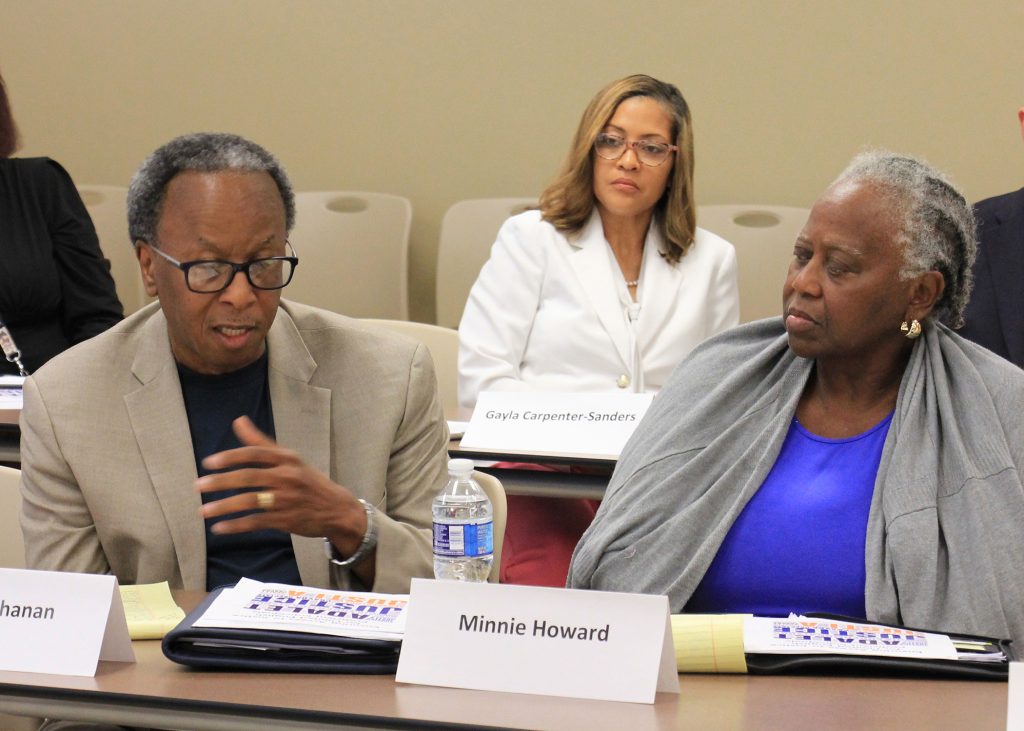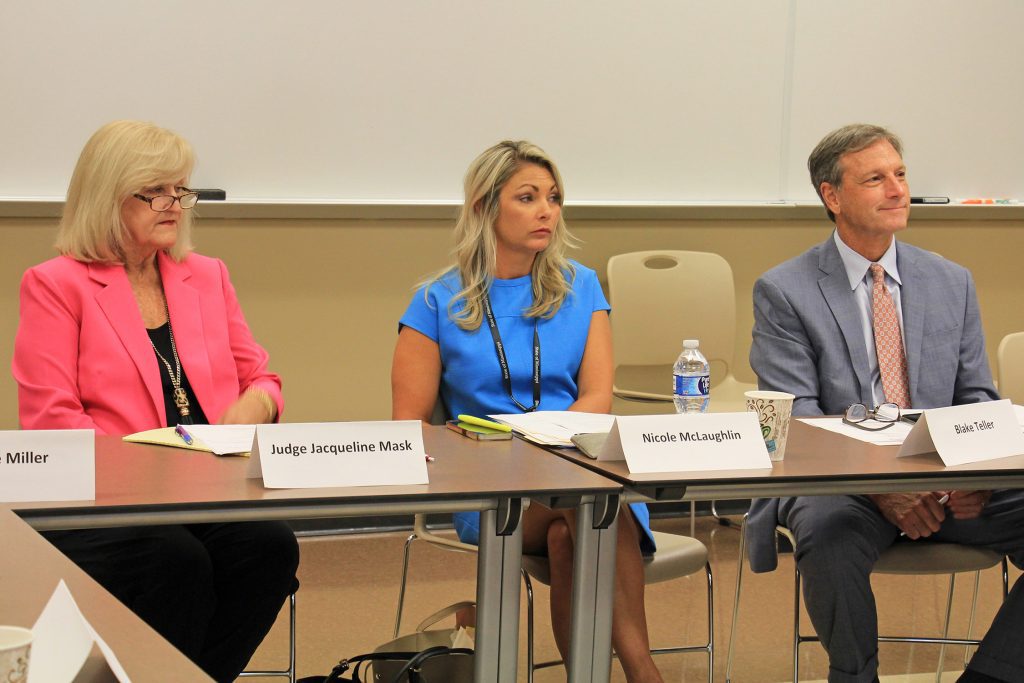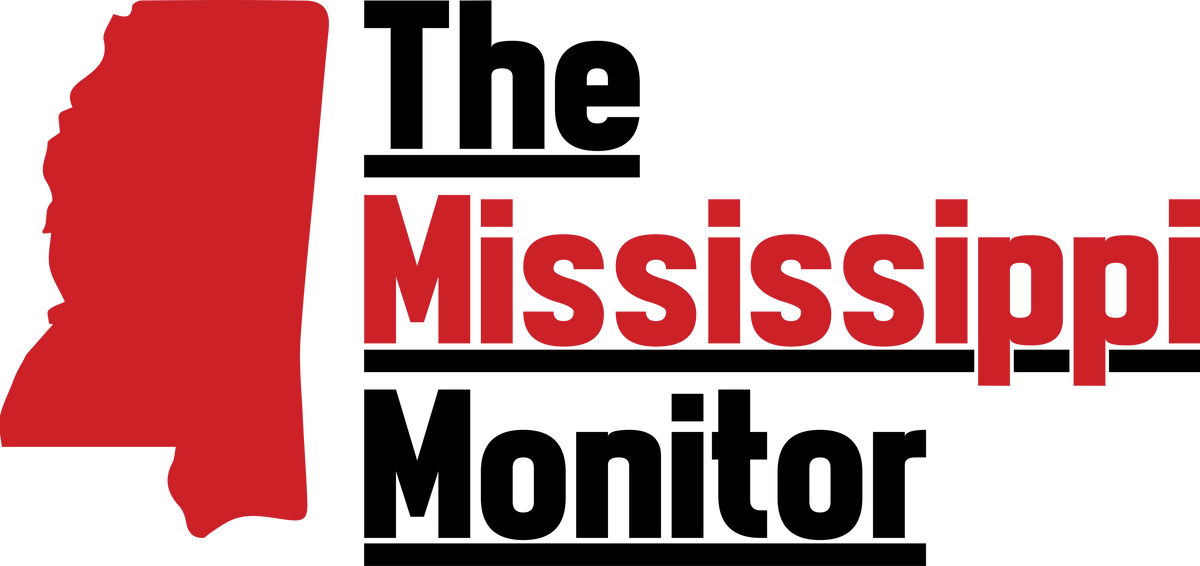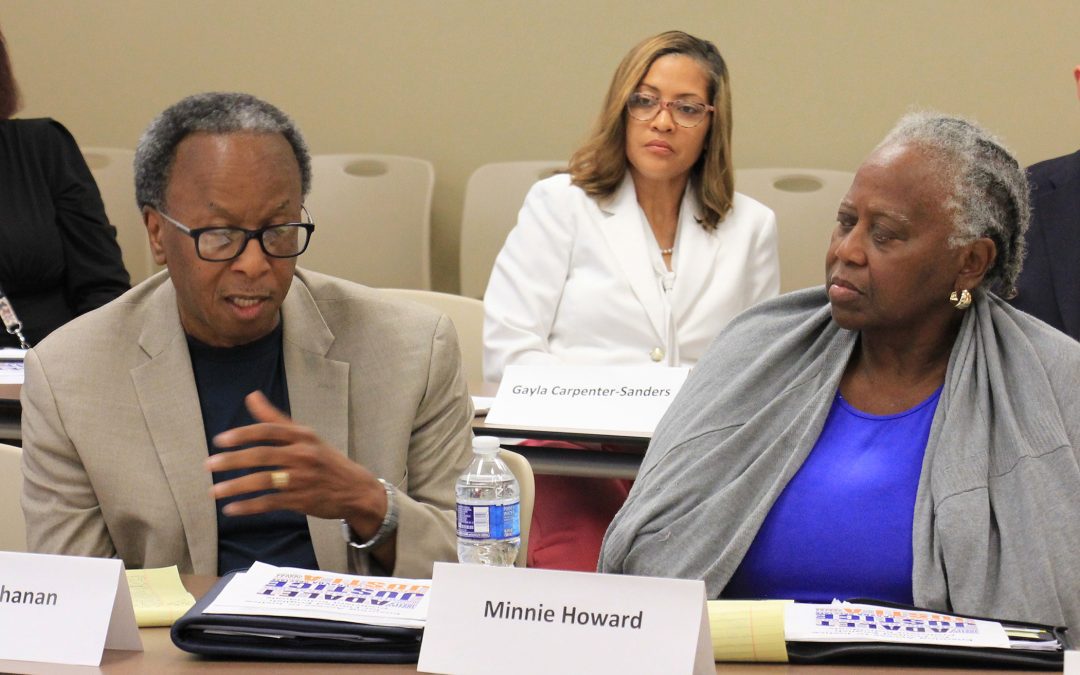
Mississippi Center for Legal Services Executive Director Sam Buchanan, at left, discusses possible funding losses during the Mississippi Access to Justice Meeting on Aug. 19 in Jackson. North Mississippi Rural Legal Services Deputy Director Minnie Howard is at right. Gayla Carpenter Sanders, Executive Director of the Mississippi Volunteer Lawyers Project, is at center back.
Legal aid providers face funding cuts in programs that provide assistance to the poor across Mississippi.
At the quarterly meeting of the Access to Justice Commission in Jackson on Aug. 19, service providers described loss of federal funds and more potential cuts as they search for ways to continue meeting the civil legal needs of poor people.
Gayla Carpenter Sanders, Executive Director of the Mississippi Volunteer Lawyers Project, leads an ongoing effort to recruit lawyers in private practice to give pro bono service. “The private bar has to step in. The money may go away, but the cases will not go away,” she said.
The state’s two full-time legal services agencies are the Mississippi Center for Legal Services, covering about 60 percent of the state, and North Mississippi Rural Legal Services, covering about 40 percent. About 70 percent of the programs’ funding comes from the U.S. Congress by way of the Legal Services Corporation, said Sam Buchanan of Hattiesburg, Executive Director of the Mississippi Center for Legal Services. Funding is reallocated every three years, and funding will be adjusted for Mississippi’s population loss.
Buchanan said that the U.S. House of Representatives’ proposal is a 46 percent cut nationwide. The best hope is the U.S. Senate proposal that would provide a slight increase, although inflation will mean no real gain. The President has suggested no funding for LSC.
“Zero funding would be devastating to us and the clients that we serve,” Buchanan said. “Our non-LSC sources are quite limited in Mississippi.” Even in the best case scenario of level funding, vacant attorney positions can’t be filled.
Legal Services offices also fear the possibility that the federal government might take back money previously budgeted in a “clawback,” said Minnie Howard, Deputy Director of North Mississippi Rural Legal Services.
“From our access to justice perspective, we already do not have enough. It would be an extreme loss for Mississippi,” said Access to Justice Commission Executive Director Nicole McLaughlin of Tupelo.
Federally funded Protection and Advocacy programs around the country also fear funding cuts. While the U.S. Senate has proposed level funding, the President has called for deep cuts. Funding cuts could affect the work of programs like Disability Rights Mississippi, the Protection and Advocacy agency for individuals with disabilities in Mississippi.
Other programs planned and approved for grants this year saw funding cancelled. For instance, the Office of State Public Defender was poised to move forward with a study of outcomes regarding parent representation in Youth Court. A grant had been approved for more parent attorneys and interdisciplinary team members, training and data collection, said Jennifer Morgan, Parent Defense Program Manager at OSPD. The Judicial, Court and Attorney Measures of Performance grant was cancelled.
Sanders and others emphasized the importance of looking to private resources to fill the gaps. The Volunteer Lawyers Project, always looking for lawyers to represent low income people pro bono, is repeating the Legal Ambassadors program introduced in 2023. MVLP is recruiting up to 25 pro bono attorneys to provide critically needed services in counties with five or fewer practicing lawyers, Sanders said. The aim is to provide representation from start to finish in family law cases. Each lawyer will take on four cases and participate in a family law clinic. The Legal Ambassadors program will run from September through May.
Leaders of the Mississippi Bar are working to encourage lawyers to considering practicing law in underserved areas including small towns. There aren’t enough lawyers to serve all the paying clients or the pro bono needs in some counties.
After he was sworn in as Mississippi Bar President on July 11 at the Mississippi Bar Convention, Rhea Tannehill of Oxford said that recruiting lawyers to practice in underserved areas will be a priority. He noted the difficulty of recruiting lawyers to practice in the Mississippi Delta. Issaquena County has no lawyers practicing from an office in that county. In east Mississippi, Kemper County is among several counties that have only one local lawyer. “I think everyone realizes it has become an issue in small communities,” he said.

Access to Justice Co-chair Chancellor Jacqueline Mask, at left, Access to Justice Executive Director Nicole McLaughlin, center, and Co-chair Blake Teller, at right, listen to a discussion about funding for legal assistance for the poor on Aug. 19 in Jackson.
New Access to Justice Commission Co-chairman Blake Teller of Vicksburg said a shortage of lawyers in small towns is a problem in other areas of the country as well. “That’s an access to justice issue.”
Classes began in August at the Mississippi College School of Law and the University of Mississippi School of Law. Dean John Anderson reported that 179 first year law students enrolled at MCLaw, and Dean Fred Slabach said that 163 first year law students started classes at Ole Miss.
Introducing high school students to careers in law and encouraging law students to consider small town law practice are among ongoing initiatives of the Access to Justice Commission. Trial judges and local lawyers in Tupelo and Natchez conducted law day camps for local high school students, and the Mississippi Court of Appeals hosted an appellate law camp, all in June. The programs in Tupelo and Natchez gave college scholarships.
The Themis Law Camp in Tupelo started four years ago and lit sparks of interest. “They all leave saying that they want to go to law school, and it’s proving true for some of them,” McLaughlin said. “We now have former campers applying to law school.”

